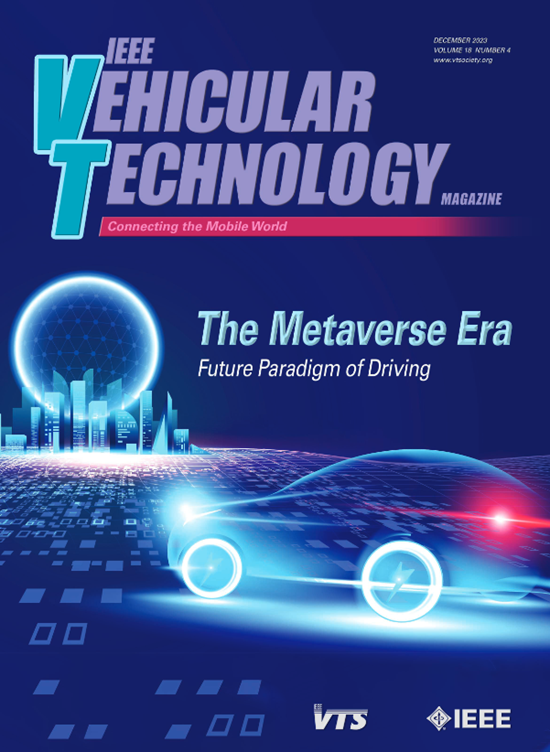混合可重构智能元表面:为 6G 无线通信实现同步可调反射和传感
IF 7.2
2区 计算机科学
Q1 ENGINEERING, ELECTRICAL & ELECTRONIC
引用次数: 0
摘要
关于即将到来的 6G 无线通信的最新讨论将未来的网络设想为一个统一的通信、传感和计算平台。最近构想的智能无线电环境概念由可重构智能表面(RIS)实现,为实现这一愿景做出了贡献,提供了可编程的信息信号传播。典型的 RIS 实现包括元表面,其单元元件几乎是无源的,能够以可控方式反射入射波。然而,这种单纯的反射操作给无线网络协调者优化 RIS 带来了巨大挑战。例如,RIS 缺乏本地调整其反射模式的信息,这些信息只能由其他网络实体获取,然后与 RIS 控制器共享。此外,信道估计对于由 RIS 驱动的相干通信至关重要,但现有的 RIS 设计却很难做到这一点。本文回顾了新兴的混合反射和传感 RIS(HRIS)概念,该概念使元表面能够以可控方式反射撞击信号,同时传感部分信号。HRIS 的传感能力有助于实现各种网络管理功能,包括信道参数估计和定位,同时产生潜在的计算自主和自配置元表面。我们讨论了 HRIS 的硬件设计,并详细介绍了全波电磁(EM)概念验证。我们强调了 HRIS 与纯反射式同类产品相比的独特性能,并介绍了一项仿真研究,以评估 HRIS 执行全参数信道估计的能力。此外,还介绍了 HRIS 概念带来的未来研究挑战和机遇。本文章由计算机程序翻译,如有差异,请以英文原文为准。
Hybrid Reconfigurable Intelligent Metasurfaces: Enabling Simultaneous Tunable Reflections and Sensing for 6G Wireless Communications
The latest discussions on upcoming 6G wireless communications are envisioning future networks as a unified communications, sensing, and computing platform. The recently conceived concept of the smart radio environment, enabled by reconfigurable intelligent surfaces (RISs), contributes toward this vision, offering programmable propagation of information-bearing signals. Typical RIS implementations include metasurfaces with almost passive unit elements capable of reflecting their incident waves in controllable ways. However, this solely reflective operation induces significant challenges for RIS optimization from the wireless network orchestrator. For example, RISs lack information to locally tune their reflection pattern, which can be acquired only by other network entities and then shared with the RIS controller. Furthermore, channel estimation, which is essential for coherent RIS-empowered communications, is challenging with the available RIS designs. This article reviews the emerging concept of hybrid reflecting and sensing RISs (HRISs), which enables metasurfaces to reflect the impinging signal in a controllable manner while simultaneously sensing a portion of it. The sensing capability of HRISs facilitates various network management functionalities, including channel parameter estimation and localization, while giving rise to potentially computationally autonomous and self-configuring metasurfaces. We discuss a hardware design for HRISs and detail a full-wave electromagnetic (EM) proof of concept. The distinctive properties of HRISs, in comparison to their solely reflective counterparts, are highlighted, and a simulation study evaluating HRISs’ capability for performing full and parametric channel estimation is presented. Future research challenges and opportunities arising from the HRIS concept are also included.
求助全文
通过发布文献求助,成功后即可免费获取论文全文。
去求助
来源期刊

IEEE Vehicular Technology Magazine
ENGINEERING, ELECTRICAL & ELECTRONIC-TELECOMMUNICATIONS
CiteScore
14.10
自引率
1.20%
发文量
66
审稿时长
>12 weeks
期刊介绍:
IEEE Vehicular Technology Magazine is a premier publication that features peer-reviewed articles showcasing advancements in areas of interest to the IEEE Vehicular Technology Society. Our scope encompasses theoretical, experimental, application, and operational aspects of electrical and electronic engineering relevant to motor vehicles and associated land transportation infrastructure. This includes technologies for terrestrial mobile vehicular services, components, systems, and auxiliary functions within motor vehicles, as well as components and systems used in both automated and non-automated facets of ground transport technology. The magazine focuses on intra-vehicular components, systems, and applications, offering tutorials, surveys, coverage of emerging technology, and serving as a platform for communication between the IEEE VTS governing body and its membership. Join us in exploring the latest developments in vehicular technology.
 求助内容:
求助内容: 应助结果提醒方式:
应助结果提醒方式:


